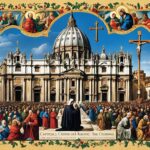Roman Catholicism is one of the largest organized religions in the world, with the Catholic Church being the largest Christian denomination. It has a rich history and a unique set of beliefs, doctrines, and rituals that shape the faith of its adherents. In this article, we will explore the key elements of Roman Catholicism, including its history, sacraments, teachings, and traditions.
Key Takeaways
- Roman Catholicism is the largest Christian denomination with a rich history and unique set of beliefs.
- The Catholic Church has evolved and spread to every continent over time.
- The sacraments play a central role in the life of a Roman Catholic.
- Roman Catholicism has teachings that cover a wide range of topics including morality and social justice.
- Traditions and rituals foster a sense of community among Roman Catholic believers.
The History of Roman Catholicism
Roman Catholicism has a rich and intricate history that spans over two thousand years. It traces its roots back to the early Christian community established by Jesus Christ and his apostles. Through the centuries, the Catholic Church has played a significant role in shaping the course of Western civilization and has undergone a series of transformations and developments.
One of the key events in the history of Roman Catholicism is the establishment of the papacy and the primacy of the Bishop of Rome, later known as the Pope. The Pope became the central figure in the governance and leadership of the Church, providing spiritual guidance and unity to millions of Catholics around the world.
“The Catholic Church is an ancient institution with a rich and complex history. Its roots can be traced back to the time of Jesus and the apostles, and its development has been shaped by numerous historical events and individuals.” – Pope Francis
Throughout its history, the Catholic Church has faced various challenges, including schisms, heresies, and conflicts. It has also played a pivotal role in the spread of Christianity, the preservation of knowledge during the Middle Ages, and the promotion of art, education, and social justice.
| Key Events | Impact on Catholicism |
|---|---|
| The Great Schism of 1054 | Led to the permanent division between the Roman Catholic Church and the Eastern Orthodox Church. |
| The Protestant Reformation in the 16th century | Resulted in a significant split within Western Christianity, leading to the formation of various Protestant denominations. |
| The Second Vatican Council in the 20th century | Radically transformed the liturgy, practices, and engagement of the Catholic Church with the modern world. |
Understanding the history of Roman Catholicism is crucial to comprehending its doctrines, traditions, and influence on the lives of millions of believers today.
The Beliefs and Doctrines of Roman Catholicism
Roman Catholicism encompasses a set of core beliefs and doctrines that form the foundation of the faith. These beliefs shape the worldview of Roman Catholics and guide their understanding of the divine and their place in the world. Central to these beliefs is the concept of the Holy Trinity, which asserts that God exists as three distinct persons—Father, Son, and Holy Spirit—in one divine being. This belief reflects the understanding that God is both immanent and transcendent, intimately involved in the world while also being beyond human comprehension.
In addition to the belief in the Trinity, Roman Catholicism upholds the divinity and humanity of Jesus Christ. Catholics believe that Jesus is the Son of God who became incarnate to redeem humanity from sin and reconcile them with God. This belief in the divinity of Jesus is coupled with the doctrine of the Incarnation, which emphasizes the humanity of Jesus, fully experiencing the joys and sufferings of human life.
Another fundamental aspect of Roman Catholicism is the authority of the Pope, the Bishop of Rome who is considered the successor of Saint Peter. The Pope is regarded as the Vicar of Christ and the visible head of the Church on earth. His authority is seen as derived from his role as the successor to Peter, to whom Jesus entrusted the keys to the kingdom of heaven. The Pope’s teachings carry great weight and are considered infallible when he speaks ex cathedra, or from the chair of Peter, on matters of faith and morals.
The veneration of Mary, the mother of Jesus, and the saints is also a key aspect of Roman Catholicism. Catholics believe in the intercession of the saints, asking them to pray on their behalf to God. Mary, in particular, holds a special place of honor as the Mother of God and the model of faith and holiness for all believers. The veneration of Mary and the saints is not worship but a recognition of their exemplary lives and their closeness to God.
The Seven Sacraments of Roman Catholicism:
- Baptism
- Confirmation
- Eucharist
- Reconciliation
- Anointing of the Sick
- Holy Orders
- Matrimony
The sacraments hold a significant place in Roman Catholicism, serving as visible signs of God’s grace and presence. They are regarded as encounters with the divine, through which believers receive sanctifying grace and are strengthened in their faith. The seven sacraments are Baptism, Confirmation, Eucharist, Reconciliation, Anointing of the Sick, Holy Orders, and Matrimony. Each sacrament has its own rituals and significance, marking different stages and moments in the spiritual journey of a Catholic.
Overall, the beliefs and doctrines of Roman Catholicism reflect a faith that is deeply rooted in tradition, Scripture, and the teachings of the magisterium. These beliefs shape the lives of Roman Catholics and guide their actions, providing a framework for moral living and spiritual growth.
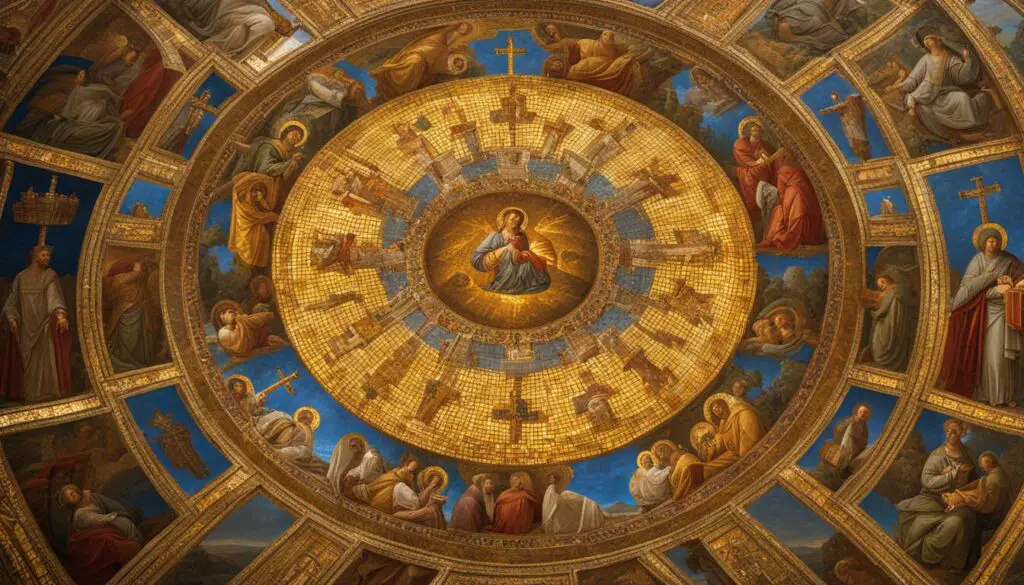
The Sacraments of Roman Catholicism
| Sacrament | Description |
|---|---|
| Baptism | A sacrament by which a person becomes a member of the Church and is cleansed of original sin. |
| Confirmation | A sacrament in which the Holy Spirit is bestowed upon an individual, strengthening their faith and commitment to Christ. |
| Eucharist | A sacrament in which bread and wine are consecrated and become the body and blood of Christ, consumed by the faithful as a source of spiritual nourishment. |
| Reconciliation | A sacrament of forgiveness, where individuals confess their sins to a priest and receive absolution. |
| Anointing of the Sick | A sacrament in which the sick and suffering are anointed with holy oil, bringing them spiritual strength and healing. |
| Holy Orders | A sacrament through which men are ordained as deacons, priests, or bishops, empowering them to serve the Church and administer its sacraments. |
| Matrimony | A sacrament in which a man and a woman enter into a lifelong covenant of love and commitment, blessed by the Church. |
Roman Catholicism places great importance on the sacraments, which are sacred rituals that bestow grace and deepen the spiritual connection between believers and God. There are seven sacraments in total, each serving a distinct purpose in the life of a Catholic.
Baptism is the first sacrament, marking the entry into the Church and the cleansing of original sin. Confirmation follows, allowing individuals to receive the gifts of the Holy Spirit and affirm their commitment to the faith. The Eucharist, also known as Holy Communion, is the central sacrament of Catholicism, symbolizing the presence of Christ in the bread and wine.
Reconciliation, also called Confession, offers the opportunity for Catholics to seek forgiveness for their sins and receive absolution from a priest. The Anointing of the Sick brings spiritual strength and healing to those who are ill or suffering. Holy Orders is the sacrament through which men are ordained as deacons, priests, or bishops, and Matrimony is the sacrament of marriage.
The sacraments are considered essential for the spiritual growth and salvation of Catholics, providing them with the grace needed to live according to the teachings of the Church.
Each sacrament holds deep significance and is celebrated within the framework of liturgical rituals. They serve as transformative moments in the lives of believers, reinforcing their faith and fostering a closer relationship with God.
The Teachings of Roman Catholicism
Roman Catholicism encompasses a wide range of teachings that guide the beliefs and practices of its followers. These teachings are rooted in Scripture, tradition, and the interpretation of the magisterium, the official teaching authority of the Catholic Church. Understanding the teachings of Roman Catholicism is essential for believers to live their lives in accordance with the principles of their faith.
One of the fundamental teachings of Roman Catholicism is the belief in the Holy Trinity – the Father, the Son (Jesus), and the Holy Spirit. This belief forms the foundation of the Christian faith and is central to the understanding of God’s nature and relationship with humanity.
Another important teaching is the significance of the Roman Catholic Church as the one true Church founded by Jesus Christ. The Church is believed to be the instrument through which God’s grace is dispensed to the faithful, and the Pope, as the successor of Saint Peter, holds the highest authority within the Church.
| Teaching | Description |
|---|---|
| Sacraments | The sacraments are sacred rituals that are believed to impart grace and bring believers closer to God. They include Baptism, Confirmation, Eucharist, Reconciliation, Anointing of the Sick, Holy Orders, and Matrimony. |
| Morality | Roman Catholicism provides guidance on moral issues such as the sanctity of life, the importance of social justice, the role of conscience, and the pursuit of virtue. |
| Social Justice | The Catholic Church teaches that all individuals have a responsibility to work towards creating a more just and compassionate society, advocating for the rights of the poor, marginalized, and vulnerable. |
These are just a few examples of the teachings of Roman Catholicism. The faith offers guidance on a wide range of topics, including spirituality, prayer, the role of the Church in the world, and the pursuit of holiness. By embracing these teachings, believers strive to deepen their relationship with God and live out their faith in their daily lives.
The Rituals and Traditions of Roman Catholicism
Roman Catholicism is known for its rich rituals and traditions that are observed in worship and throughout the liturgical year. These rituals are deeply rooted in the history and teachings of the Catholic Church and play a crucial role in the spiritual lives of its followers.
In the celebration of Mass, the central liturgical ceremony of Roman Catholicism, believers gather to commemorate the Last Supper, reenacting the transformative moment when Jesus transformed bread and wine into His body and blood. The Mass is a sacred ritual that brings together the community of the faithful, offering prayers, readings from Scripture, and the reception of the Eucharist.
Another significant tradition in Roman Catholicism is the recitation of the Rosary. The Rosary is a form of prayer that involves the repetition of Hail Marys, Our Fathers, and Glory Bes, while meditating on the mysteries of the life of Jesus and Mary. It is a devotional practice that fosters reflection, contemplation, and deepens the spiritual connection between the believer and the divine.
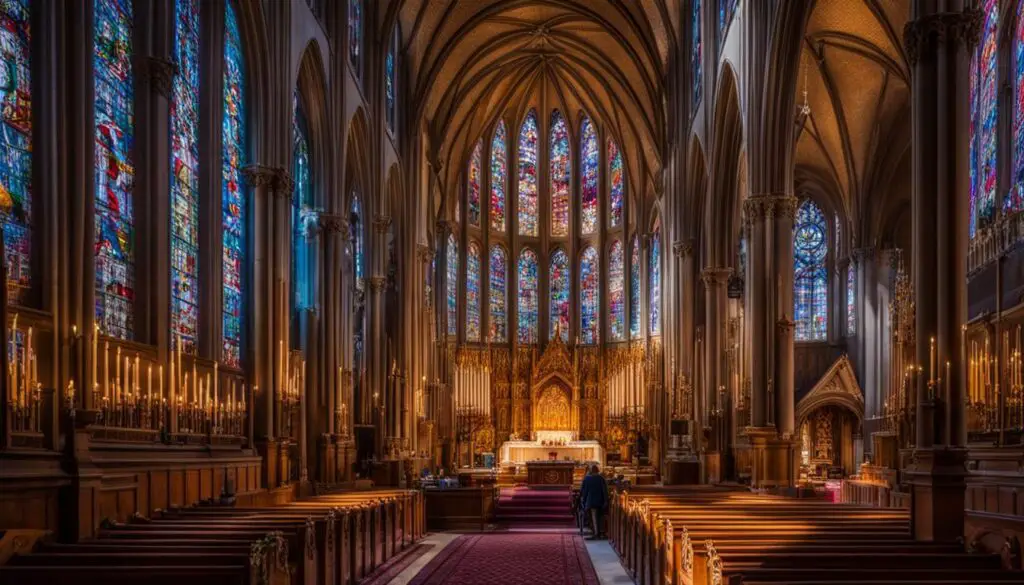
Additionally, Roman Catholicism embraces various devotions and rituals such as the Stations of the Cross, which commemorates Jesus’ journey to His crucifixion, and the Liturgy of the Hours, a daily pattern of prayer that marks different times of the day. These rituals and traditions serve as pathways for believers to express their faith, seek guidance, and experience spiritual growth within the framework of their religious community.
The Role of the Pope in Roman Catholicism
The Pope, as the spiritual leader of the Roman Catholic Church, holds a significant position in the hierarchy of the Church. The Pope is considered the successor of Saint Peter, who Jesus designated as the “rock” upon which He would build His Church. This belief forms the foundation for the authority and influence of the Pope within Roman Catholicism.
The role of the Pope is multifaceted and encompasses various responsibilities. As the supreme authority in matters of faith and morals, the Pope guides and directs the Church’s teachings, ensuring that they align with the core beliefs and doctrines of Roman Catholicism. The Pope’s pronouncements are considered infallible when made ex cathedra, meaning that they are proclaimed from the chair of Peter and are deemed to be without error.
Furthermore, the Pope plays a crucial role in preserving the unity of the Catholic Church. Through his leadership and guidance, the Pope ensures that the Church remains united in its beliefs, practices, and teachings. This is particularly important in a religion that spans across different cultures and regions, as it helps to maintain consistency and cohesion among Roman Catholics worldwide.
“The Pope serves as the supreme authority in matters of faith and morals, and his pronouncements are considered infallible when made ex cathedra.”
– Catholic Church teaching
Moreover, the Pope serves as a symbol of unity and represents the Church on a global scale. Through diplomatic efforts and interfaith dialogue, the Pope actively engages with other Christian denominations and religions to promote mutual understanding and cooperation. The Pope’s visits to different countries and his involvement in various international events demonstrate the universal reach and influence of Roman Catholicism under the leadership of the Pope.
Roman Catholicism and Social Justice
Social justice is a fundamental principle of Roman Catholicism, reflecting the Church’s commitment to promoting equality and advocating for the rights and well-being of all individuals. Rooted in the belief that every human being is created in the image of God, Roman Catholics are called to uphold the inherent dignity and worth of every person, regardless of their background or circumstances.
The Catholic Church’s teachings on social justice are grounded in scriptures, particularly the call to love one’s neighbor and care for the marginalized and vulnerable. These teachings emphasize the importance of solidarity, the common good, and the preferential option for the poor. Roman Catholics are encouraged to actively engage in charitable works and to address systemic injustices in society.
“I want a Church that is poor and for the poor” – Pope Francis
The Catholic Church has a long tradition of social activism and advocacy, working to alleviate poverty, promote human rights, and combat issues such as inequality, discrimination, and injustice. Through initiatives such as Caritas Internationalis, the Church provides humanitarian aid and development assistance to communities around the world.
| Examples of Catholic Social Justice Initiatives | Impact |
|---|---|
| Caritas Internationalis | Provides assistance to over 160 countries, reaching millions of people affected by poverty, conflict, and natural disasters. |
| Catholic Charities | Offers a wide range of services including food assistance, shelter, healthcare, and support for immigrants and refugees. |
| JustFaith Ministries | Provides educational programs that invite individuals to explore issues of social justice and embody their faith through action. |
By actively engaging in social justice initiatives, Roman Catholics seek to live out the values of their faith and make a positive impact in their communities and the world at large. Through their efforts, they strive to create a more just, compassionate, and inclusive society, reflecting the teachings and example of Jesus Christ.
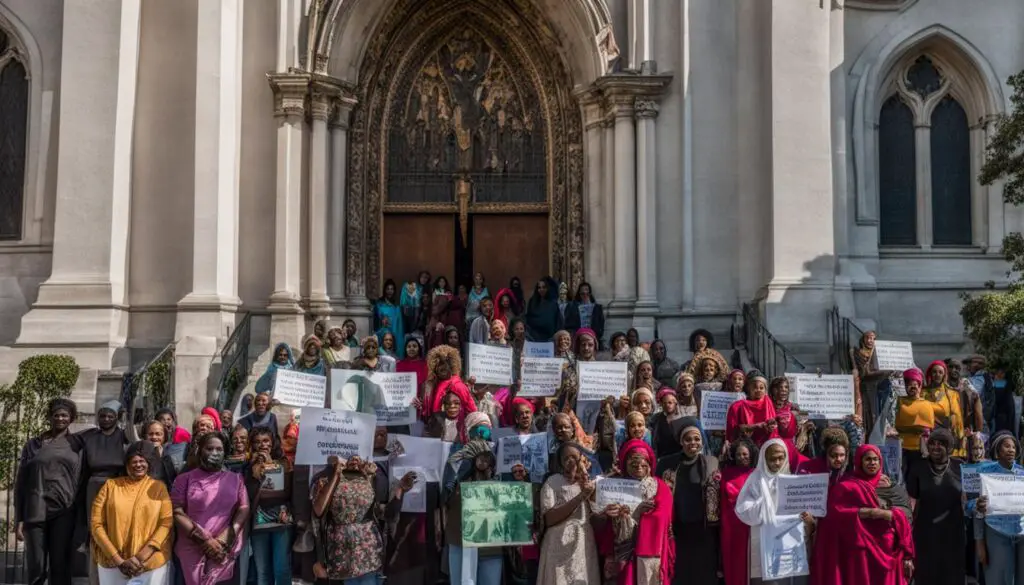
Roman Catholicism and Ecumenism
Ecumenism plays a significant role in the Roman Catholic Church’s efforts to foster unity among different Christian denominations and promote interfaith dialogue. The Church recognizes the importance of collaboration and understanding among believers of different traditions to work towards common goals and honor the teachings of Jesus Christ.
Through ecumenical initiatives, the Catholic Church seeks to overcome historical divisions and build bridges of mutual respect, cooperation, and shared worship. These efforts include theological dialogues, joint worship services, and collaborative social and charitable projects. The aim is to strengthen relationships, promote reconciliation, and achieve greater harmony among Christians.
“That they may all be one, just as you, Father, are in me, and I in you, that they also may be in us, so that the world may believe that you have sent me.” – John 17:21
The Importance of Ecumenism
Ecumenism is driven by the belief that all Christians are united by their faith in Jesus Christ and share a common mission to spread the Gospel and serve humanity. It recognizes that differences in worship styles, traditions, and interpretations of Scripture should not hinder the pursuit of unity and cooperation.
By engaging in ecumenical dialogue and collaboration, the Catholic Church aims to promote a spirit of love, respect, and understanding among Christians, fostering an atmosphere of peace and harmony. It acknowledges the diversity within the body of Christ and seeks to celebrate and learn from each other’s traditions and experiences.
Challenges and Opportunities
While ecumenism brings hope for unity and cooperation, it also faces challenges. Differences in theological perspectives, doctrinal interpretations, and historical grievances can hinder progress towards greater unity. However, through sincere dialogue, prayer, and a commitment to finding common ground, these obstacles can be overcome.
Ecumenism is not without its critics and skeptics, who voice concerns regarding the dilution of distinct beliefs and the potential loss of identity. However, the Catholic Church believes that unity does not require uniformity but rather a mutual recognition of the essential truths and a shared commitment to the teachings of Christ.
Through ongoing efforts towards ecumenism, the Roman Catholic Church strives to fulfill its mission of promoting Christian unity, fostering peace, and advancing the cause of justice and love in the world.
Roman Catholicism in Modern Times
Roman Catholicism, as one of the oldest and most influential religious traditions in the world, has faced numerous challenges in adapting to the realities of the modern era. The Catholic Church has grappled with changing demographics, secularization, religious pluralism, and complex moral and ethical dilemmas. However, it remains a significant force in the lives of millions of believers worldwide.
In response to these challenges, the Catholic Church has endeavored to bring the teachings of Jesus and the Gospel into dialogue with contemporary issues. This includes addressing social justice concerns such as poverty, inequality, and human rights violations. The Church’s commitment to social justice is rooted in its belief that all individuals are made in the image of God and possess inherent dignity and worth.
To foster a more just and compassionate society, the Catholic Church encourages its followers to actively engage in works of charity and justice. This may involve volunteering in local communities, advocating for policy changes, and supporting organizations that promote social justice causes. By doing so, Roman Catholics strive to live out their faith not only in personal devotion but also in their interactions with the wider world.
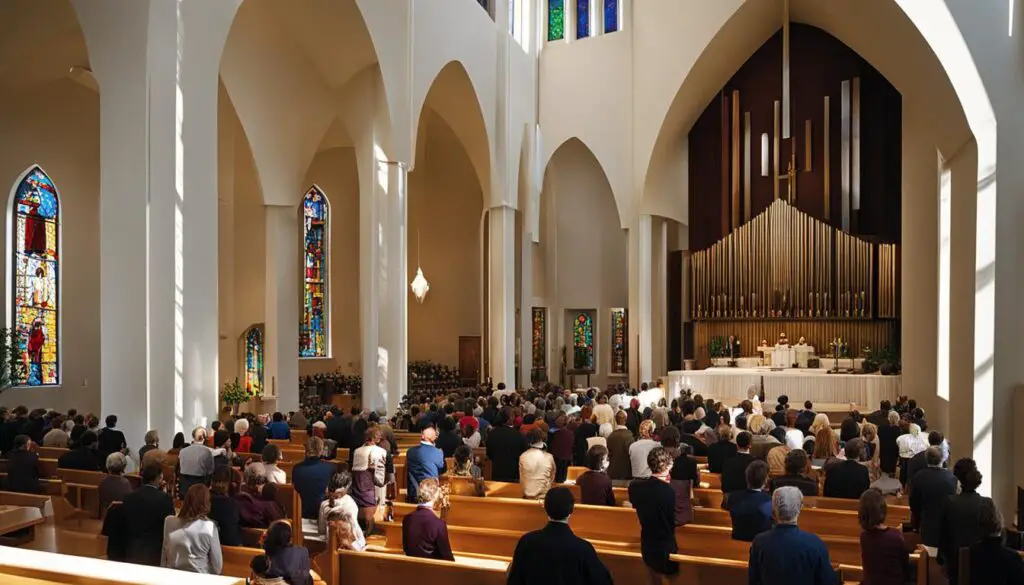
Table: Challenges Faced by Roman Catholicism in Modern Times
| Challenge | Impact |
|---|---|
| Changing demographics | Shifts in religious affiliation and declining church attendance |
| Secularization | Diminished influence of religious institutions in public life |
| Religious pluralism | Increasing diversity of religious beliefs and practices |
| Moral and ethical dilemmas | Debates surrounding issues such as abortion, euthanasia, and LGBTQ+ rights |
Despite these challenges, Roman Catholicism continues to endure and adapt. The Church seeks to strike a balance between preserving its traditions and engaging with the world around it. By remaining true to its core beliefs and teachings while addressing the concerns of the modern era, Roman Catholicism seeks to remain relevant and impactful in the lives of its followers.
The Future of Roman Catholicism
The future of Roman Catholicism holds both challenges and opportunities for the Catholic Church. As the world continues to change at a rapid pace, the Church must adapt to the evolving needs of its followers and society as a whole. The future of Roman Catholicism lies in its ability to maintain its core beliefs and teachings while effectively addressing the pressing issues of the modern world.
One of the key areas of focus for the future of Roman Catholicism is the engagement with younger generations. The Church must find ways to connect with and engage young people to ensure the continuity of the faith. This includes providing relevant and meaningful spiritual guidance, fostering a sense of community, and addressing the questions and concerns that arise in a rapidly changing world.
Another important aspect of the future of Roman Catholicism is the role of technology and digital media. The Church can leverage these tools to reach a wider audience, spread its message, and provide resources for spiritual growth. Embracing technology can help the Church adapt to the changing needs and preferences of its followers, particularly in the digital age.
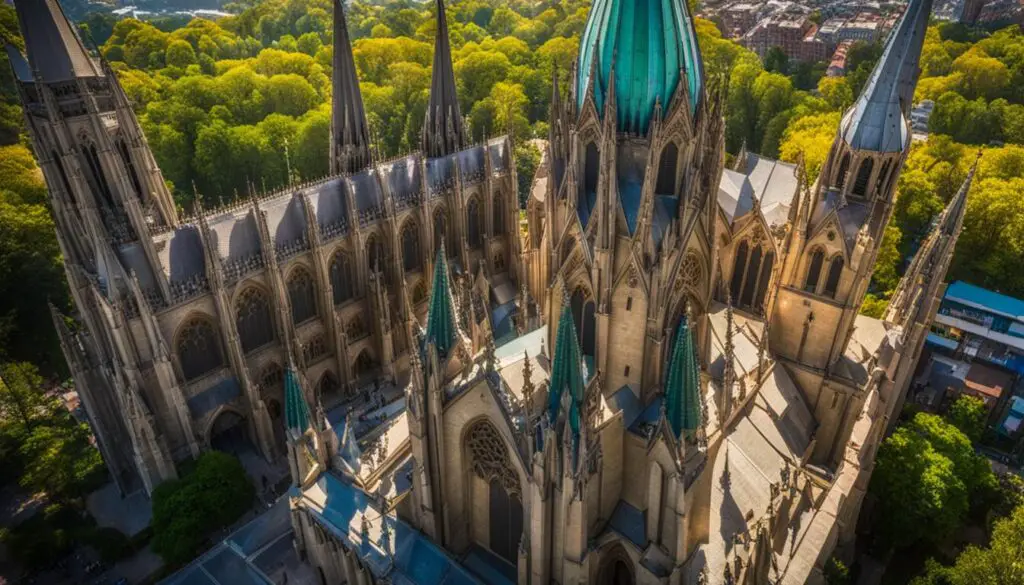
Challenges and Opportunities
The future of Roman Catholicism also presents challenges and opportunities in the realm of social justice and inclusivity. The Church must continue to advocate for the rights of the marginalized and oppressed, promoting equality and justice for all. This includes addressing issues such as poverty, discrimination, and environmental stewardship.
Furthermore, the future of Roman Catholicism hinges on its ability to foster ecumenical dialogue and collaboration with other Christian denominations and religions. Building bridges and finding common ground with diverse faith communities can lead to a more cohesive and peaceful world, reflecting the core values of the Catholic Church.
Conclusion
Roman Catholicism is a profound and complex religion with a rich history, deep-rooted beliefs, and meaningful rituals and traditions. The Catholic Church, as the largest Christian denomination, has played a significant role in shaping the course of history and the spiritual lives of millions of people.
By exploring the key elements of Roman Catholicism, including its history, beliefs, sacraments, teachings, and traditions, we gain valuable insights into the faith and culture of its followers. From its origins in the teachings of Jesus and the early Church to its present-day engagement with social justice and ecumenism, Roman Catholicism has continually adapted to the challenges of the modern world while remaining true to its core principles.
As we look to the future, the commitment and dedication of Roman Catholics will continue to shape the journey of the Catholic Church. By embracing the teachings of their faith, actively participating in sacraments and rituals, and working towards social justice and unity, the followers of Roman Catholicism can bring its timeless message of love, hope, and compassion to a world in need.
In conclusion, Roman Catholicism offers a path of spiritual growth, community, and service. Its profound beliefs, rich history, and vibrant traditions provide a firm foundation for its followers to live out their faith and make a positive impact in the world.
FAQ
What is Roman Catholicism?
Roman Catholicism is one of the largest organized religions in the world, with the Catholic Church being the largest Christian denomination. It has a rich history and a unique set of beliefs, doctrines, and rituals that shape the faith of its adherents.
What is the history of Roman Catholicism?
The origins of Roman Catholicism can be traced back to the one Church founded by Christ. Over time, the Church has evolved and spread to every continent, shaped by historical events, teachings of Jesus and the early Church, and formulation of doctrine by Church Fathers and councils.
What are the core beliefs and doctrines of Roman Catholicism?
Roman Catholicism has core beliefs such as the Holy Trinity, the divinity and humanity of Jesus, the authority of the Pope, the importance of Mary and the saints, and the sacraments. These beliefs are based on Scripture, tradition, and the teachings of the official teaching authority of the Church.
What are the sacraments of Roman Catholicism?
The seven sacraments of Roman Catholicism are Baptism, Confirmation, Eucharist, Reconciliation, Anointing of the Sick, Holy Orders, and Matrimony. Each sacrament is believed to impart grace and bring the believer closer to God.
What are the teachings of Roman Catholicism?
Roman Catholicism has teachings on morality, social justice, spirituality, and the role of the Church in the world. These teachings are based on Scripture, tradition, and the interpretation of the official teaching authority of the Church.
What are the rituals and traditions of Roman Catholicism?
Roman Catholicism has rituals like the Mass, Liturgy of the Hours, Stations of the Cross, and prayer practices like the Rosary. Traditions include fasting, pilgrimage, and devotion to saints. These rituals and traditions provide a framework for worship and foster a sense of community among believers.
What is the role of the Pope in Roman Catholicism?
The Pope is the spiritual leader of the Roman Catholic Church and the successor of Saint Peter. The Pope serves as the supreme authority in matters of faith and morals and plays a crucial role in guiding the Church and preserving its unity and teachings.
What is the social justice aspect of Roman Catholicism?
Roman Catholicism advocates for the rights of the poor, marginalized, and vulnerable. It promotes principles like solidarity, the common good, and the preferential option for the poor. Roman Catholics are called to actively engage in works of charity and justice to create a more just and compassionate society.
What is the stance of Roman Catholicism on ecumenism?
Roman Catholicism actively engages in dialogue and collaboration with other Christian denominations and religions. The Church seeks to foster unity and promote understanding and respect among people of different faiths.
How does Roman Catholicism adapt to the modern world?
Roman Catholicism continues to evolve and adapt to the challenges and realities of the modern world. The Church faces issues like changing demographics, secularization, religious pluralism, and moral and ethical dilemmas. It strives to bring the teachings of Jesus and the Gospel into dialogue with contemporary issues while staying true to its traditions and core beliefs.
What does the future hold for Roman Catholicism?
The future of Roman Catholicism lies in the commitment and dedication of its followers and leaders. The Church must continue to engage in dialogue, address social and moral issues, and adapt its practices to meet the needs of future generations.





